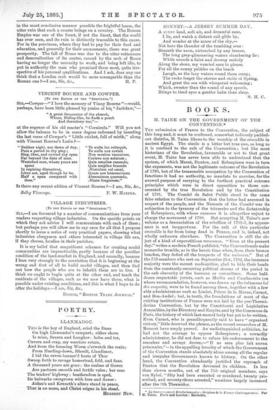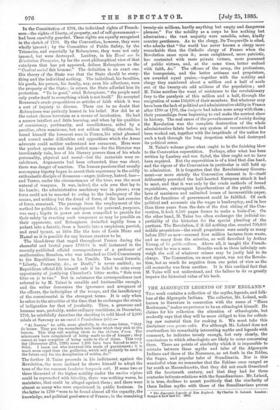BOOKS.
M. TAINE ON THE GOVERNMENT OF THE CON VENTION.*
THE submission of France to the Convention, the subject of this long and, it must be confessed, somewhat tediously padded- out diatribe, M. Taine likens to the worship of the crocodile in ancient Egypt. The simile is a bitter but true one, so long as it is confined to the cult of the Convention ; but like most historians of the Revolution, favourable or not to that great event, M. Taine has never been able to understand that the system, of which Marat, Danton, and Robespierre were in turn the exponents, was not the legitimate outcome of the Revolution of 1789, but of the treasonable usurpation by the Convention of functions it had no authority, no mandate to exercise, for the avowed purpose of carrying to the furthest practical extreme principles which were in direct opposition to those con- secrated by the true Revolution and by the Constitution of 1791. The Comae de Salnt Public stood in the same false relation to the Convention that the latter had assumed in respect of the people, and the Nemesis of the Comit6 was its subjection to the tyranny of the triumvirs and the dictatorship of Robespierre, with whose excesses it is altogether unjust to charge the movement of 1789. But accepting M. Taine's new volume as a denunciation of the rebellion of 1792-3, its appear- ance is not inopportune. For the cult of this particular crocodile is far from being dead in France, and is, indeed, not wholly unknown elsewhere. The Convention is still the ob- ject of a kind of superstitious reverence. "Even at the present day," writes a modern French publicist, "the Conventionals make monarchs tremble, as in the heroic time when, from their bronze benches, they defied all the tempests of the universe." But of the 753 members who met on September 21st, 1792, the immense majority were the merest mediocrities, glad to hide their heads from the constantly-recurring political storms of the period in the safe obscurity of the bureaux or committees. Some half- dozen respectable jurists, such as Merlin and Cambaceres (on whose recommendation, however, was drawn up the infamous loi des suspects), were to be found among them, together with a few able administrators such as Lindet, Prieur de la Marne, Carnot, and Bon-Andr6 ; but, in truth, the foundations of most of the existing institutions of France were not laid by the pre-Thermi- dorian Convention, but by the Constituent and Legislative Assemblies, by the Directory and Empire, and by the Commune de Paris, the history of which last-named body has yet to be written. Even Carnot, who is grandiloquently said to have "organised victory," little deserved the phrase, as the recent researches of M. Ronsset have amply proved. An undistinguished politician, he had not the courage to oppose Robespierre ; a cowardly administrator, he did not dare to refuse his endorsement to the senseless and savage decree,—" II ne sera plus fait attain prisonnier,"—in the appalling ferocity of which the Government of the Convention stands absolutely alone among all the regular and irregular Governments known to history. On the other hand, the Convention abundantly justified the reproach of Danton that the Revolution devoured its children. In less than eleven months, out of the 753 • original members, says von Sybel, "fifty had been executed or murdered, twenty pro- scribed, and seventy-three arrested," numbers largely increased after the 9th Thermidor.
* Le Gourernement Rerodutionnaire: Origins. de la France Contemporaine. Par H. Tains. Paris and London: Hachette.
In the Constitution of 1791, the individual rights of French- men—the rights of liberty, of property, and of self-government— had been carefully guarded. These rights are equally recognised in the sketch of 1793. By the Convention; however, they were wholly ignored ; by the Committee of Public Safety, by the Triumvirs, and especially by Robespierre, they were not only
ignored, but were destroyed. Laufrey, in his Essai sur /a Revolution Francaise, by far the most philosophical view of that cataclysm that has yet appeared, defines Robespierre as the " Contrat social fait homme." The definition is an exact one. His theory of the State was that the State should be every-
thing and the individual nothing. The individual, his faculties, his goods, his person, his family, nay, even his affections, were the property of the State ; in return the State afforded him its protection. "To be good," cried Robespierre, "the people need only prefer itself to everything which is not itself." He accepted Rousseau's crude propositions as articles of faith which it was a sort of impiety to discuss. There can be no doubt that .Robespierre was perfectly honest in his belief. Nor did be at the outset choose terrorism as a means of inculcation. He had a narrow intellect and little learning, and when by his qualities of consistency, pertinacity, and unselfishness, aided by a peculiar, often wearisome, but not seldom telling, rhetoric, he found himself the foremost man in France, his mind gloomed and soured under difficulties and oppositions which the Arras advocate could neither understand nor surmount. Here were the perfect system and the perfect man—for the Dictator was inordinately vain, less of his literary powers than of his whole personality, physical and moral—but the materials were re- calcitrant. Arguments had been exhausted, time was short, there was danger of reaction. The human passions that usually accompany bigotry began to assert their supremacy in the coldly enthusiastic disciple of Rousseau—anger, jealousy, hatred, fear— and Terror, under the circumstances of the time, was the most natural of weapons. It was, indeed, the sole arm that lay to his hands; the administrative machinery was in pieces ; even force could not be resorted to owing to the inadequacy of the means, and nothing but the dread of force, of the last exercise of force, remained. The passage from the employment of the method for political, to its employment for personal, purposes, was easy ; bigots in power are soon compelled to provide for their safety by exacting such vengeance as may be possible on their opponents, and Robespierre dwindled rapidly from a pedant into a fanatic, from a fanatic into a suspicious, peevish, and cruel tyrant, as little like the hero of Louis Blanc and Hamel as it is possible for any human creature to be.
The blood-fever that raged throughout France during the shameful and brutal years 1793-94 is well instanced in the recently-published official correspondence of a professor of mathematics, Benaben, who was attached as Civil Commissary to the Republican forces in La Vendee. The usual formula, "Liberty, Fraternity, &c., or Death," is never omitted ; no Republican official felt himself safe if he failed to seize every opportunity of justifying Chamfort's bitter motto, " Sois mon
frbre on je to tue." But in substance the correspondence (not referred to by M. Take) is sensible and businesslike enough; and the writer denounces the ignorance and arrogance of the officers, the indiscipline of the troops, and the insufficiency of the commissariat in the strongest terms. It is only when he refers to the atrocities of the time that he exchanges the strain of indignation for that of jocularity. Thus, a generous and humane man, probably, under ordinary conditions, in December, 1793, he mirthfully describes the shooting in cold blood of 2,000 rebels at Savenay as an envoi a l'ambulence (sic):— " At Nantes," he adds, more gleefully, in the same letter, "they do better. They put the scoundrels into boats which they sink to the bottom. This they call sending them to the château d' eau. The miscreants have complained of being made to die of hunger ; they cannot at least complain of being made to die of thirst. This very day (December 27th, 1793) some 1,200 have been forced to take a drink. I know not who invented this mode of punishment; it is much more rapid than the guillotine, which will probably be used in the future only for the decapitation of nobles, &c."
The further M. Take proceeds in his indictment, against the Revolution, the more inclined he shows himself to adopt the tone of the too common laudator tern pens acti. If some two or three thousand of the higher nobility under the ancien regime could be reproached with frivolity, there was nothing worse, he
maintains, that could be alleged against them ; and there were almost as many who were experienced in public business. In the latter in 1789 "were to be found almost all the capacity, the knowledge, and political good-sense of France; in the remaining
twenty-six millions, hardly anything but empty and dangerous phrases." For the nobility as a corps be has nothing but admiration ; the vast majority were sensible, sober, kindly country gentlemen. As to the clergy, Be Tocqueville is cited, who admits that "the world has never known a clergy more remarkable than the Catholic clergy of France when the Revolution came upon it; more enlightened, more patriotic, less contented with mere private virtues, more possessed of public virtues, and, at the same time, better endued with faith, &c," The officers of the army, the professions, the bourgeoisie, and the better artisans and proprietors, are awarded equal praise,—together with the nobility and clergy they numbered about a million and a half of souls out of the twenty-six odd millions of the population ; and M. Take ascribes the want of resistance to the revolutionary fury to the paralysis of this million and a half, through the emigration of some 150,000 of their members. But whatever may have been the lack of political and administrative ability in France after 1790 or 1791, the entigr6s had taken none away with them ; their proceedings from beginning to end make the sorriest show in history. The real cause of the powerlessness of society during the Revolution was the complete destruction of the whole administrative fabric before any system of reconstruction had been worked out, together with the inaptitude of the nation for such a task through the long despotism which had destroyed its political sense.
M. Taine's volume gives what ought to be the finishing blow to the Convention superstition. Perhaps, after what has been written by Lanfrey and von Sybel, the blow ought not to have been required. But the superstition is of a kind that dies hard, and the vigour of the Convention in particular is still held up to admiration. It is forgotten that the Revolutionary Govern- ment—or more strictly the Convention element in it—itself deliberately provoked the half-hearted European attack it had to meet, and that it was only by the crude methods of forced requisitions, extravagant hypothecations of the public credit, laws of maximum and unlimited issues of inconvertible paper, that the functions of government could be fulfilled. Of such political and economic sin the wages is bankruptcy, and in less than three years from the date of the first sitting of the Con- vention, it took 8,500 paper francs to make a louis-d'or. On the other hand, M. Take too often exchanges the judicial im- partiality of the historian for the special pleading of the partisan. The Revolution, if if did nothing else, created 700,000 middle proprietors—the small proprietors were nearly as many before 1789 as now—rescued four million hectares from waste, and as many from the miseries, so well described by Arthur Young, of /a petite culture. Above all, it taught the French- man that he was a man. Benefits such as these infinitely out- weigh the evil of whatever crimes may be justly laid to its charge. The Convention, we must repeat, was not the Revolu- tion, but as much its negation from one point of view as the old monarchy was from another. It is this cardinal fact that M. Take will not understand, and, the failure to do so greatly impairs the historical value of his book.



































 Previous page
Previous page